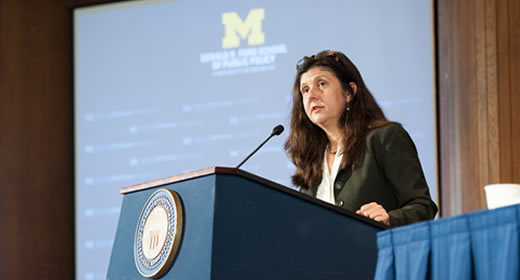
While the economy experiences one of the longest period of sustained growth, many Americans are already concerned about the likelihood of the next recession. For many, the wounds of the Great Recession are only now beginning to heal and the thought of another economic downturn is enough to divert career paths and alter spending habits as well as personal financial decisions.
Ford School Professor Betsey Stevenson succinctly characterizes this mindset in Emily Stewart’s March 27 Vox story "Recessions, and the fear that another one is around the corner, explained," which details the typical precursors of economic recessions. “For many,” Stevenson tells Stewart, “the effect of a recession is fear, not an actual loss. It’s fear of loss.” Nevertheless, fear alone is potent enough to cool optimism for the near-future of our economy. In a 2018 survey of how millennials evaluate the strength of the economy, majority of respondents saw the economy as “fair or poor.”
Thus, as the economy continue to booms, many are preparing for the bust. But there remains reasons for a more positive outlook. “Something has to happen that knocks the economy off course,” Stevenson said. Currently, no such shock has occurred. Despite other indicators of a coming recession such as a declining housing or stock market, trade wars, or an inverted yield curve (in which short-term interest rates become higher than rates for long-term loans), no such “disaster event” has taken place.
Professor Stevenson, therefore, remains confident. Her concern, however, is the effect of such pessimistic expectations. Fear of the next recession, says Stevenson, can catalyze an economic contraction: “If people start to worry about economic downturn, consumers start saving their money instead of spending, and businesses put investment decisions off, making the likelihood of things going south greater.”
If history shows us anything, a recession is inevitable—it is a characteristic of our economy. After a long period of growth it is natural to be on guard, especially following the Great Recession. But even though there have been economic tremors, a fault line is unlikely to emerge. At the moment, the only thing to fear is fear itself.
Click here to read the full story in Vox.
Betsey Stevenson is an associate professor of public policy at the Ford School, with a courtesy appointment in the Department of Economics. She is also a research associate with the National Bureau of Economic Research, a fellow of the Ifo Institute for Economic Research in Munich, and serves on the board of directors of the American Law and Economics Association. Betsey recently completed a two-year term as an appointed member of the White House Council of Economic Advisers. She served as the chief economist of the U.S. Department of Labor from 2010 to 2011.